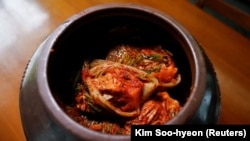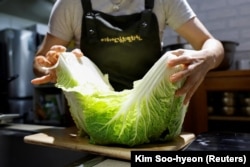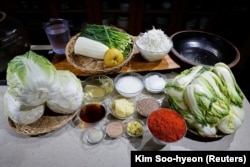One of the most popular foods in South Korea is kimchi. It is a kind of fermented cabbage or other vegetables. Now farmers, manufacturers and scientists say climate change is affecting the quality and quantity of the napa cabbage used to make the dish.
Cabbage grows best in cooler climates. Growers usually plant it in mountainous areas where temperatures during the summer growing season used to stay mostly below 25 degrees Celsius.
Studies show that warmer weather tied to climate change is now threatening these crops. There may even come a time when it will be too hot for South Korea to be able to grow napa cabbage.
Lee Young-gyu studies diseases that attack plants. He said the best temperatures for cabbage are between 18 and 21 degrees Celsius.
In the fields and in kitchens - both in factories and homes - farmers and kimchi makers are already feeling the change.
Spicy, fermented kimchi is made from other vegetables such as radish, cucumber, and green onion, but the most popular form is still mostly cabbage.
The Agriculture Ministry calls Lee Ha-yeon a Kimchi Master because of her knowledge of kimchi. She said that in higher temperatures, the heart of the cabbage goes bad, and the root softens.
"If this continues, then in the summertime we might have to give up cabbage kimchi," said Lee.
Shrinking crop area
The government statistics agency reports the area of highland cabbage farmed last year was about 4,000 hectares. That is less than half of what it was 20 years ago.
The Rural Development Administration, a state farming organization, predicts that the farmed area for napa cabbage will shrink in the next 25 years to just 44 hectares. They expect there will be no cabbage grown in the highlands by 2090.
Researchers point to three reasons for such a small area of crops. They include higher temperatures, unpredictable heavy rains and unwanted insects and diseases that become more difficult to control in the warmer and longer summers.
South Korea's kimchi industry is already fighting lower-priced imports from China, which are mostly served in restaurants. Those imports rose by almost seven percent for the year through the end of July. That is the highest level ever.
New cabbage varieties
The government is trying to prevent high prices and shortages by storing large amounts of cabbage. Scientists are also racing to develop crop varieties that can grow in warmer climates, handle changes in rainfall and resist fungal infections.
Seventy-one-year-old Kim Si-gap is a farmer who has worked in the cabbage fields of the eastern region of Gangneung all his life. Kim fears these varieties will be more costly to grow. And they might not taste the same.
"When we see the reports that there will come a time in Korea when we can no longer grow cabbage, it was shocking on the one hand and also sad at the same time," Kim said.
"Kimchi is something we cannot not have on the table. What are we going to do if this happens?"
I’m Jill Robbins.
Sebin Choi, Hyun Young Yi, Daewoung Kim and Jihyun Jeon reported this story for Reuters. Jill Robbins adapted it for Learning English.
______________________________________________
Words in This Story
ferment – v. to go through a chemical change that results in the production of alcohol
kitchen –n. a room where cooking is done
spicy - of food: flavored with or containing strong spices and especially ones that cause a burning feeling in your mouth
statistic – n. number that represents a piece of information (such as information about how often something is done, how common something is, or the like)
variety – n. a particular kind of person or thing
fungal –adj. related to fungus, a form of life that is neither plant nor animal such as mushrooms
What do you think of this story? Write to us in the Comments Section.








Forum